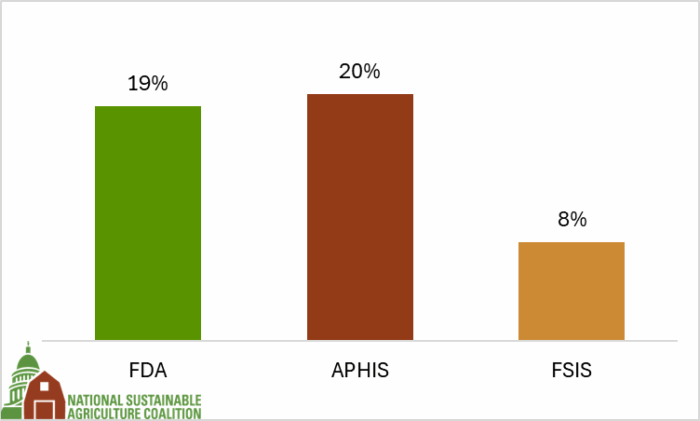
Federal food safety agencies have seen significant staff losses in 2025, threatening their ability to serve stakeholders and ensure the safety of our food supply Several federal agencies – including the Food and Drug Administration (FDA), the US Department of Agriculture’s (USDA) Food Safety and Inspection Service (FSIS), and Animal and Plant Health Inspection Service (APHIS) – hold this responsibility. These federal agencies work with state partners to set and enforce food safety standards and help reduce the risk of foodborne illness outbreaks or the spread of disease from animals to humans. Staffing losses at the agencies, particularly inspectors and outreach professionals, threaten the safety of the US food system and the ability to serve agricultural enterprises of all types and sizes
This post continues the National Sustainable Agriculture Coalition’s (NSAC) series on the federal staffing crisis by examining staff losses at key food safety agencies. In this post, we extend our lens beyond the United States Department of Agriculture (USDA) to also include the Food and Drug Administration (FDA), which is part of the Department of Health and Human Services (HHS). This is the sixth post in the series. Previous posts have given an overview of USDA staffing losses and cuts at key USDA agencies. All of the posts in the staffing crisis series are here.
Staff losses at FSIS and APHIS in particular will likely be further exacerbated by the USDA’s planned reorganization. On July 24, 2025, USDA announced a major reorganization of the department, drafted without any input from farmers, Congress, or other stakeholders. The National Sustainable Agriculture Coalition (NSAC) continues to encourage USDA to allow meaningful stakeholder input into any reorganization and to share all comments that were received from stakeholders via an ad hoc public comment. NSAC’s reorganization comment can be seen here.
Food Safety Agencies Face Severe Staffing Shortages
Each of the food safety agencies has experienced significant staff losses in 2025. APHIS has seen the most dramatic staff reductions, losing approximately 20% of their staff to the Deferred Resignation Program (DRP) and other separations between January and March 2025. FSIS lost approximately 8% of their workforce to the DRP and separations. The DRP was a program led by the Department of Government Efficiency (DOGE) to reduce federal staff numbers by offering incentives for employees to resign. Unfortunately, it is not yet clear how many FDA employees left the agency via the DRP, but they have lost at least 3,500 staff to reductions in force in April 2025 and an additional 411 employees to other separations between January and March 2025, according to data from the Office of Personnel Management (OPM). It is not yet entirely clear what portions of these positions have been lost within the broader Human Food Program, or the Office of Produce Safety, those sections within FDA that most impact farmers and the food system.
Figure 1: Percentage of Staff Lost to DRP and Separations
While each agency takes a different approach and has different responsibilities regarding food safety, these staff losses will pose major challenges for them to fulfill their missions. APHIS, with the largest staff loss percentage, is responsible for preventing and addressing the spread of plant and animal disease. This means that they do not inspect final food products, but their efforts to prevent the spread of pests and disease help protect the human food chain from contamination. After the resignation and separation of more than 1,600 employees, APHIS found itself scrambling to refill positions that it realized were essential to securing the safety of the American food and agriculture system. FSIS is the agency responsible for ensuring the safety of meat, poultry, and egg products. It conducts continuous inspection at slaughter facilities and verifies that processors meet federal food safety standards. It also liaises with and provides support to states that run their own meat inspection agencies, which have been shown to benefit small meat processors, and other supplementary programs such as the Cooperative Interstate Shipment that support small processors. With hundreds of staff lost in 2025, the agency faces growing gaps in its ability to provide adequate inspection and support for processors, particularly small plants.
Reorganization Threatens to Worsen Staffing Crisis
These widespread staff losses at food safety agencies are likely to be further exacerbated by the USDA’s planned reorganization. While APHIS and FSIS are not specifically named in the reorganization plan, they will undoubtedly experience its impacts. One of the major tenets of the reorganization plan is the movement of USDA staff and offices outside of the Washington, DC capitol region. Approximately 14% of APHIS staff and approximately 8% of FSIS staff are located in Washington, DC, Maryland, or Virginia, according to data from OPM. Secretary of Agriculture, Brooke Rollins expects up to 50% of USDA’s capitol area staff to leave the Department because they decline to relocate. Similarly, they will experience its universal proposal for consolidation of support, FOIA, and Tribal relationship functions. For FSIS in particular, which provides voluntary inspection for non-amenable species including bison, often cultivated by different Tribal nations, this lack of direct connections between FSIS and Tribes could prove harmful. These additional staff losses and other impacts of the planned reorganization will further disrupt the ability of the agencies to fulfill their missions and serve stakeholders.
Losing Institutional Knowledge and Technical Expertise
The staff at these agencies that safeguard food safety are highly specialized professionals and each loss represents a loss of essential institutional knowledge. It is impossible to know specific occupations or experiences of the staff who accepted the DRP. This is due to the failure of OPM or other agencies to provide any detailed information on the tens of thousands of staff who left federal employment via the program. NSAC joins the calls of many other stakeholders for OPM and all agencies to provide detailed information on the scope and impact of DRP resignations.
While we cannot know the scope of lost institutional knowledge due to the DRP, the FDA staff who otherwise separated from the agency between January and March 2025 had an average of 21 years of experience and the FDA inspectors who separated, specifically, had an average of 19 years of experience, according to data from OPM. The FSIS employees who separated had an average of 16 years of service and APHIS employees had an average of 10 years of experience. Approximately 15% of the APHIS employees who separated from the agency also held masters degrees, doctorates, or another advanced degree, again according to data from OPM. Within FSIS, more than 63% of the staff who separated from the agency were classified as part of the investigations group, which includes inspectors.
Together, these staff losses threaten the ability of the agencies to both safeguard food safety and to effectively engage with stakeholders such as small and diversified farms and processors. For example, FDA is responsible for the implementation of the Food Safety Modernization Act (FSMA) that significantly expanded the regulation of fruit and vegetable production. NSAC continues to advocate that it is essential that these standards be appropriate and accessible for small and diversified farms and those who implement sustainable practices. Fewer staff at FDA, particularly in the education and inspection domains, may lead to a lack of experience in the design of the remaining FSMA rules and undermine their appropriateness for a wide range of farms, especially those pursuing activities which help mitigate climate and environmental impacts.
Rebuilding the Workforce for a Safe and Thriving Food System
Together, the staff at these different agencies help ensure a safe food system that serves consumers and farmers. These major staff losses are extremely concerning not just for preventing foodborne illness but also for the ability of the agencies to develop, educate, and enforce standards and regulations in a manner that is appropriate for farmers and processors of all sizes.
If they are understaffed and overstretched, agencies like FSIS might prioritize working with large processing facilities, as no statutory provision explicitly stops them from doing so. This would undermine support and outreach to small and midsize firms. For example, during the recent federal government shutdown, there is evidence that FSIS continued to pay inspectors at large processing facilities while inspectors at small and midsized plants were not paid. This can lead to declines in inspector morale, inspection quality, and long term struggles in hiring and retaining future inspectors. Adequately staffing these and other federal agencies is essential to serve stakeholders and fulfill the mission of USDA and FDA. NSAC calls for the immediate restoration of staffing levels as well as transparency and stakeholder input for both the staffing plans and the proposed reorganization.
The post USDA Staffing Crisis: Food Safety Agencies Struggle as Federal Workforce Shrinks appeared first on National Sustainable Agriculture Coalition.















